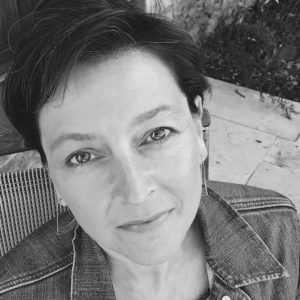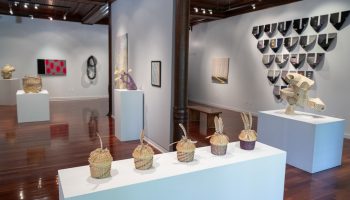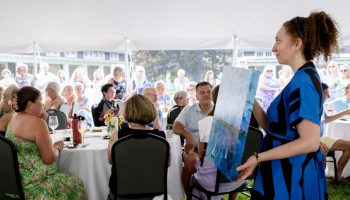
In 1993, Kristin Kovacic became a mother and discovered that “motherhood is one of the great underwritten subjects.” So, with Lynne Barrett, Kovacic co-edited the 2002 book, Birth: A Literary Companion, a guide full of writing from authors like Sylvia Plath, Margaret Atwood and Charles Baxter. Kovacic described the text as “a What to Expect for the emotional truth of one of life’s great adventures.”
“Though there was plenty of advice on motherhood and parenting, there was very little truth-telling, I felt, which is the province of literature,” Kovacic said. “(Birth: A Literary Companion) was published by the University of Iowa Press in 2002, and I am very gratified to know that it has served as a companion to many parents since then.”
From her book House of Women, a collection unabashed in its exploration of womanhood as it relates to domesticity, to 2019’s History of My Breath, essays on family and life, Kovacic has explored themes of parenthood in her poetry and prose.
“To have children — to shelter, nourish, guide and understand them — is the central work of humanity,” she said. “So I feel my work is at the intersection of both what it means to work and what it means to be human. I can’t think of anything more necessary and complex to write about, though of course there are rivers of sentimentality on the subject that are tough to navigate. I suppose I challenge myself to write about being a parent both truthfully and unsentimentally — without anybody getting hurt.”
The Week Eight prose writer-in-residence, who was most recently a writer-in-residence at the Chautauqua Writers’ Center in 2015, is the winner of a Pushcart Prize for nonfiction. At 12:15 p.m. Friday, August 16 on the porch of the Literary Arts Center at Alumni Hall, she will offer a Brown Bag lecture titled “Of Forest and Trees: Distance and the Art of Revision.” In other words, she said, it is a craft talk on “the stuff everyone will have to do after they go home from Chautauqua.”
Using her essay “On Usefulness,” the piece she read Sunday in the Hall of Philosophy, as a case study, Kovacic will lead the audience through seven steps formulated to transform a first draft, “something as ephemeral as a diary entry,” into a “meaningful and publishable” work.
“I hope it will be useful for all audiences, and I particularly hope it will be useful to my workshop students who will be headed home with shaky first drafts of several pieces of writing,” she said.
A teacher at Winchester Thurston School and Carlow University’s low-residency MFA program, Kovacic spent her week at Chautauqua leading the prose workshop, “Your Life Is an Argument: The Personal Political Essay.”
“I love helping writers see the larger arguments embedded in their fascinating, ordinary lives,” she said. “And if we don’t tell our stories, someone else will, as the memoirist Patricia Hampl says. That’s the scary political fact.”
Counting Phillip Lopate, Hampl and George Orwell among greats of the personal-political genre, Kovacic recommends reading each author’s respective work, specifically Lopate’s “The Story of My Father,” Hampl’s “Memory and Imagination,” and Orwell’s “Why I Write” and “Such, Such Were the Joys.” Her inspiration, however, often comes from those to whom she sends these texts.
“I am inspired by all the courageous living I get to witness as I help my students harvest their life stories,” Kovacic said. “When I learn from my students about the ways in which they struggle to feed their families, or how a mother coped with her child’s opioid addiction, or how a young man felt in basic training for a war he didn’t understand, I understand on an intimate, visceral level, how strong and wise human beings can be. It gives me hope for the future, at a political and ecological moment when hope sometimes feels hard to muster. And this is why I feel this work — of making literary meaning from our lives — is important for all of us to attempt in some form.”




